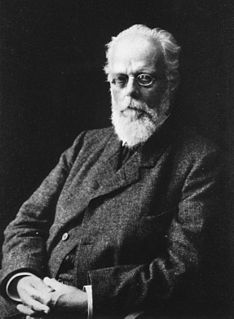A Quote by Johann Wolfgang von Goethe
Must it ever be thus-that the source of our happiness must also be the fountain of our misery? The full and ardent sentiment which animated my heart with the love of nature, overwhelming me with a torrent of delight, and which brought all paradise before me, has now become an insupportable torment, a demon which perpetually pursues and harrasses me.
Related Quotes
Disease is the misery of our belief, happiness is the health of our wisdom, so that man's happiness or misery depends on himself. Now, as our misery comes from our belief, and not from the thing believed, it is necessary to be on the watch, so as not to be deceived by false guides. Sensation contains no intelligence or belief, but is a mere disturbance of the matter, called agitation, which produces mind, and is ready to receive the seed of error. Ever since man was created, there has been an element called error which has been busy inventing answers for every sensation.
The pursuit of happiness is a great activity. One must be open and alive. It is the greatest feat man has to accomplish, and spirits must flow. There must be courage. There are no easy ruts to get into which lead to happiness. A man must become interesting to himself and must become actually expressive before he can be happy.
It is a conquest when we can lift ourselves above the annoyances of circumstances over which we have no control; but it is a greater victory when we can make those circumstances our helpers,--when we can appreciate the good there is in them. It has often seemed to me as if Life stood beside me, looking me in the face, and saying, "Child, you must learn to like me in the form in which you see me, before I can offer myself to you in any other aspect.
We do not draw conclusions with our eyes, but with our reasoning powers, and if the whole of the rest of living nature proclaims with one accord from all sides the evolution of the world of organisms, we cannot assume that the process stopped short of Man. But it follows also that the factors which brought about the development of Man from his Simian ancestry must be the same as those which have brought about the whole of evolution.
Our possibilities of happiness are already restricted by our constitution. Unhappiness is much less difficult to experience. We are threatened with suffering from three directions: from our own body, which is doomed to decay and dissolution and which cannot even do without pain and anxiety as warning signals; from the external world, which may rage against us with overwhelming and merciless forces of destruction; and finally from our relations to other men. The suffering which comes from this last source is perhaps more painful to us than any other.
Ardent desire for knowledge, in fact, is the one motive attracting and supporting investigators in their efforts; and just this knowledge, really grasped and yet always flying before them, becomes at once their sole torment and their sole happiness. Those who do not know the torment of the unknown cannot have the joy of discovery which is certainly the liveliest that the mind of man can ever feel.
The happiness which God designs for His higher creatures is the happiness of being freely, voluntarily united to Him and to each other in an ecstasy of love and delight compared with which the most rapturous love between a man and a woman on this earth is mere milk and water. And for that they must be free.
The thinking man must oppose all cruel customs no matter how deeply rooted in tradition or surrounded by a halo. We need a boundless ethics which will include the animals also. My life is full of meaning to me. The life around me must be full of significance to it. If I want others to respect my life, then I must respect the other life I see however strange it may be to mine. Ethics in our western world has hitherto been largely limited to the relation of man to man... but that is a limited ethics.






































